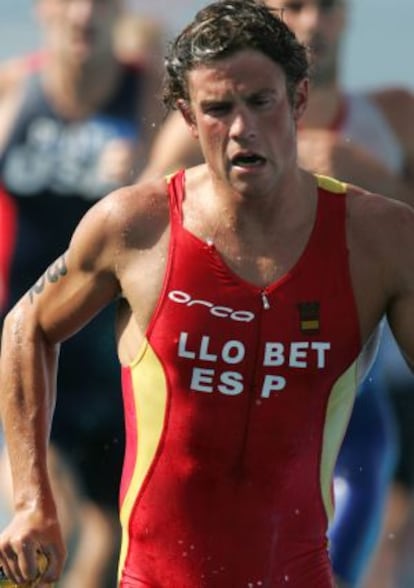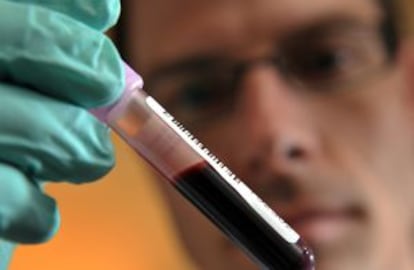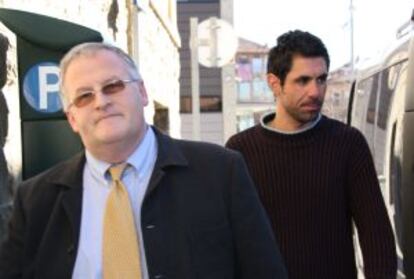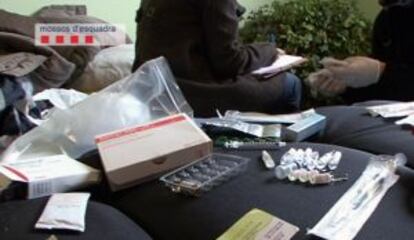Getting away with it, still
Operation Cursa is the latest probe into doping, but its results have been disappointing Madrid's failed Olympic bid may have been damaged by Spain's tarnished reputation

On February 1, 2011, two Spanish sportsmen, Xavier Llobet - who failed to complete the triathlon at the 2004 Athens Olympics - and Kelme team cyclist Jordi Riera Valls - who had been given a two-year ban for doping in 2006 - discussed their training regimes over the phone. Riera was already under investigation by the police over continued doping allegations, and his phone was being tapped.
After a few pleasantries, the pair soon moved on to the subject of buying banned substances to improve their performance, notably Actovegin, which increases the body's ability to convert glucose into energy but has dangerous side effects; Clenbuteral (Clembuterol, in Spanish), a steroid that increases muscle mass; Andriol, which includes testosterone; HMG, a growth hormone; and Solcoseryl, known as gas bus, which is based on bovine plasma and helps move oxygen around the body.
Apart from using some familiar shortenings of pharmaceutical names, such as "clembu" and "actos," the pair take no precautions, openly discussing the prices of doping substances and finally striking a 700-euro deal with "a couple of blister packs" containing an unnamed substance thrown in free.
Two weeks after the conversation, the Catalan regional police announced the arrest of seven people in Operation Cursa, among them Riera. The police continued to look for the intermediaries between an Andorra drugstore that has sent out more than 500 packages of drugs between January 2010 and March 2011. Around 40 percent went to athletes, trainers and others involved in sport in Spain and Portugal. On February 15, Llobet was questioned by the police without a lawyer. Doping was not a crime at the time of those events, but trafficking controlled substances was and is.
The athletes were recorded discussed the prices of doping substances, striking a € 700 deal
Llobet's statement was succinct. Asked about which substances Riera gave him, he told officers that in the past Riera had given him EPO, the drug of choice among athletes in endurance sports: a hormone that increases aerobic power by stimulating the body's production of red blood cells. Llobet said that he was intending to retire from sport and that he had been in touch with Riera "only a few times over the last three or four years." Llobet admitted that Riera had charged him money on "certain occasions" and that he had given him information about how to evade drug tests. The questioning took just 22 minutes, after which Llobet signed his statement. Six weeks later, Llobet was called to testify before the judge overseeing the investigation.
This time he changed his story, saying that Riera had never advised him about "medicines." He did admit that he asked Riera about "actos, Clenbuterol, injections, and testosterone," but added that his relationship with Riera was limited to the cyclist giving him a box of medicines "as a gift, because he wanted to get rid of them." Asked about the tapped conversation and the request for three boxes of Actovegin, he said he didn't remember.
Llobet's statements were part of yet another criminal investigation into doping in Spanish sport - one which, like all those before it, has come to little. In July, the CEDD national sports disciplinary committee overruled the sanction handed down to Llobet and four other athletes. The case has angered the government, and Ana Muñoz, until Friday the head of the country's anti-doping agency, has described the decision as "unacceptable."
The case began on December 13 when Xavier Tondo, a cyclist in the Movistar team who died in an accident at his home in 2011, met with a judge to tell her that he had been offered EPO and other substances via Facebook. The judge began an investigation, and regional police in Catalonia discovered that a drugstore in Andorra was sending drugs via a messenger service to destinations in Spain and Portugal; most of the recipients were athletes or involved in the sports world. Most were either amateurs or second-tier competitors.
Three Paralympic athletes were also mentioned. The court decided to inform the government's CSD Sports Council about those involved in the network and which substances they had bought.

The pharmacy's computer revealed that there were 10 bodybuilders, six mid-level athletes, among them Gustavo Platas and Felipe Carnicer, as well as 12 professional cyclists, among them Vicente Ballester Martínez, who had been arrested during Operation Puerto, the 2006 investigation into doping in cycling.
It turned out, after checking with the delivery service that there were also 11 sports medics involved, 21 athletes, 21 cyclists, two more Paralympians, 50 amateur cyclists and 11 triathletes. Two packages were also sent to Real Oviedo soccer club, and another to the medic at Hercules de Alicante soccer club. The list of recipients is long. The regional police have said that being on the list itself is not necessarily proof of having received banned substances, because nobody knows what was in the packages. Xavier Tarrés, in charge of the regional police's drugs investigation unit, says that there are three main categories of recipient: those who buy doping substances; those who buy substances requiring a prescription in Spain; and others who wanted medicines banned in Spain that are not necessarily on international lists of doping substances.
Nobody knows which category the packages fall into. But then, nobody has asked. Some of the athletes concerned have given convincing answers as to why they were on the list. David Bustos, a 1,500-meter runner who has spoken out against doping, says that his name has been confused with cyclist David Busto Portillo. When contacted by EL PAÍS, many of the people whose names are on the list said they had no idea that they were suspected of using banned substances. The country's sports authorities have chosen not to look further into the matter.
The head of the anti-doping agency called one decision "unacceptable"
The medic at Hércules said: "I may have bought some vitamin supplements, or iron, something like that. But what I bought was legal. It was the only time that I bought from the pharmacy, I found it on the internet. After so many years fighting against doping, I don't want to be mixed up in this after buying something legal," he said.
María Ramos, the chief medic at Oviedo soccer club, admits that she bought "ergogenic substances" from the drugstore: "These are legal, not banned. I met a nutritionist in the area, and it was relatively simple for me to buy from there," she says. Raquel Hernández, a judo trainer, says that she bought thioctic acid, "which delays the appearance of fatigue, and cannot be bought in Spain. A doctor recommended it to us, and it is not banned."

The majority of people on the list were not called to testify during Operation Cursa proceedings. "To prove a crime against public health, in this case the trafficking of substances, there was no need to talk to everybody on the list. We weren't interested in whether athletes were top level or not," says Xavier Torres of the Mossos d'Esquadra Catalan police force. One of the cyclists accused of buying HMG over the course of 2012, explained in an email earlier this year: "The first I heard about the subject was when I saw my name in the papers, while those really involved in this have been sanctioned and called to testify."
Until now, each sport's federation has been responsible for sanctioning athletes, and each in its own particular way. The representative of the athletics federation, for example, was not questioned. "Nobody contacted us. The first we heard about the investigation was in the media. The names involved are Gustavo Platas and Felipe Carnicer, but we didn't do anything because we weren't officially informed of any accusation," says Gerardo Cebrián, the Athletics Federation's press officer. He says he doesn't know of any other listed names belonging to members of his federation.
The police found that an Andorra store was sending drugs via messenger
While the criminal proceedings continue against distributors of banned substances, no action was taken against athletes.
Just one federation, the triathlon association, sent a representative to talk to the judge overseeing the case. This was in September 2012, after learning by accident what was going on. But once it had the names of its members, this year it took action. Thirteen people were sanctioned: Jessica Rodríguez, Spanish champion in 2010, was suspended for two years; Miguel Ángel Giménez Barragán was also suspended; as was Joan Molist for having admitted to police to taking Clenbuterol, Provirón and Winstrol. Several others were also suspended. The heaviest punishment was meted out to Xavier Llobet, who was got a three-year suspension for a "very serious infraction."
The Cycling Federation, of which he is also a member, also opened an investigation. Not that it went very far. Just two weeks after his sanction from the Triathlon Federation, Llobet was told by the cycling authorities that it was not pursuing the investigation any further, saying that the "self-incriminating statement made to the regional police violated his constitutional rights" as it was not subsequently ratified by a judge. "We have zero tolerance toward doping, but we must also provide all legal guarantees," says Fernando Uraburu, president of the Spanish Cycling Federation's disciplinary committee.
In any event, Llobet decided to appeal his triathlon ban to the CEDD national disciplinary committee, made up of legal experts chosen by the different sports federations. But Llobet contradicted himself when making his statement before the CEDD. "I do not recognize in any way the statement made to the regional police, due to the fact that it was made under pressure, threats and duress." Xavier Tarrés of the Catalan regional police denies this. "We do not threaten anybody, and I have not been informed of any complaint against me for forcing somebody to make a statement." The CEDD closed the case on July 26, just when Spain's government was trying its best to give the impression that it was taking a tough line on doping in the run-up to its bid for Madrid to host the Olympics in 2020. Some observers suggested that Madrid's loss to Tokyo at the IOC assembly last month was partly due to Spain's checkered record on doping.
The CEDD accepted Llobet's statement, and buried the suspension. The committee, which EL PAÍS has contacted to hear its version of events, says that Llobet's statement to the police was "not accompanied by the guarantees required given his position as a suspect." It said that Llobet should have had a lawyer with him when he made his statement, and not have been obliged to answer all questions. It concluded that the statement does not constitute valid evidence because it was not ratified before a judge, and adds that the right not to make a statement that could be self-incriminating or to have to admit guilt is fundamental.
Medics at Real Oviedo and Hércules soccer clubs were among recipients
Llobet's lawyer, Miguel López, says the CEDD's decision is "impeccable," because it highlights the importance of "statements made before a judge, subject to full legal guarantees." He also points out that Llobet has taken "a thousand anti-doping checks, and has never tested positive; if there were the least indication, he would have been made a suspect," adding: "My client's career and reputation have suffered irreparable damage."
He also says that Llobet's declining performance in recent years proves that he has not been taking banned stimulants. López argues that the only important aspect of the case is the resolution, which leaves the door open to bringing legal charges against any newspaper that publishes further transcriptions of police-tapped conversations involving Llobet.
The triathlete wasn't the only one to get off lightly. During June and July, the CEDD overruled sanctions against Jessica Rodríguez, arguing that her infraction was no longer applicable on a technicality; the CEDD accepted Santiago Arnés's explanation that the substance he had bought was probably the reason he tested positive in 2009; while Sergio Martín was let off simply because he was not a member of the Triathlon Federation; and finally Diego Rodríguez got off on a "lack of evidence." The police report has him down as buying a testosterone derivative. In short, all those who lodged appeals with the CEDD were exonerated.

In total, of the dozens of athletes mentioned in the judicial investigation, only a handful were found to have committed an offense and were sanctioned. The only federation to volunteer to take part was triathlon. It suspended 13 athletes, but the first five to appeal have won. The Athletics Federation says that it has not sanctioned any of its members named in the police investigation. The Cycling Federation is about to impose sanctions, but says that those already sanctioned by the Triathlon Federation will not be punished further, as it did with Llobet. Ana Muñoz, now the director general of the Sports Council, says that she is very angry about the outcome of the investigation. "As soon as I took over at the anti-doping agency I asked about how Operation Cursa was going. I saw that each of the federations were dealing with it differently. There were files that had been closed, others still awaiting a resolution, others under appeal... I asked that the agency take over, and that we wait until Operation Cursa was over so as to avoid treading on anybody's toes."
Muñoz also praises the Triathlon Federation: "They were diligent, they were concerned, they took part, and they issued sanctions. They are now very angry at how things have turned out, and I am as well." Muñoz is aware that she trots out the same line as the rest of Spain's sporting authorities, which for years have been trying to give the impression that the country is tough on doping, despite constant evidence to the contrary. "I know that we always say this, but new laws mean that this will no longer happen."
The new law she is referring to, passed in March, just days before the International Olympic Committee visited Madrid to evaluate the capital's latest bid, will allow the authorities to use data from criminal investigations to impose sanctions. "It is incomprehensible that if somebody can admit to having done something wrong, this evidence cannot be used to sanction them. This is the same as Operation Puerto - where very few people were ever sanctioned," says Muñoz. The government says that it too is angry at the outcome of Operation Cursa. The new legislation will likely see the disappearance of the CEDD. Secretary of State for Sport Miguel Cardenal has publicly criticized many of the committee's resolutions.
Tu suscripción se está usando en otro dispositivo
¿Quieres añadir otro usuario a tu suscripción?
Si continúas leyendo en este dispositivo, no se podrá leer en el otro.
FlechaTu suscripción se está usando en otro dispositivo y solo puedes acceder a EL PAÍS desde un dispositivo a la vez.
Si quieres compartir tu cuenta, cambia tu suscripción a la modalidad Premium, así podrás añadir otro usuario. Cada uno accederá con su propia cuenta de email, lo que os permitirá personalizar vuestra experiencia en EL PAÍS.
¿Tienes una suscripción de empresa? Accede aquí para contratar más cuentas.
En el caso de no saber quién está usando tu cuenta, te recomendamos cambiar tu contraseña aquí.
Si decides continuar compartiendo tu cuenta, este mensaje se mostrará en tu dispositivo y en el de la otra persona que está usando tu cuenta de forma indefinida, afectando a tu experiencia de lectura. Puedes consultar aquí los términos y condiciones de la suscripción digital.








































